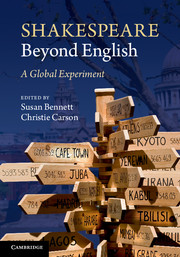Book contents
- Frontmatter
- Contents
- List of Illustrations
- List of colour plates
- Notes on contributors
- Foreword
- Acknowledgements
- Introduction
- The Globe to Globe Festival: An Introduction
- Performance Calendar
- Week One
- Chapter One U Venas no Adonisi
- Chapter Two Festival showcasing and cultural regeneration
- Chapter Three ‘What's mine is yours, and what is yours is mine’
- Chapter Four ‘The girl defies’
- Chapter Five Pericles and the Globe
- Chapter Six Technicolour Twelfth Night
- Week Two
- Week Three
- Week Four
- Week Five
- Week Six
- Afterwords
- Index
- Plate section
Chapter One - U Venas no Adonisi
Grassroots theatre or market branding in the Rainbow Nation?
Published online by Cambridge University Press: 05 June 2014
- Frontmatter
- Contents
- List of Illustrations
- List of colour plates
- Notes on contributors
- Foreword
- Acknowledgements
- Introduction
- The Globe to Globe Festival: An Introduction
- Performance Calendar
- Week One
- Chapter One U Venas no Adonisi
- Chapter Two Festival showcasing and cultural regeneration
- Chapter Three ‘What's mine is yours, and what is yours is mine’
- Chapter Four ‘The girl defies’
- Chapter Five Pericles and the Globe
- Chapter Six Technicolour Twelfth Night
- Week Two
- Week Three
- Week Four
- Week Five
- Week Six
- Afterwords
- Index
- Plate section
Summary
The Isango Ensemble from Cape Town, South Africa, kicked off the Globe to Globe Festival with a glorious interpretation of Shakespeare's epic poem that left the audience grinning from sheer exhilaration. The compelling story of desire, power, attempted seduction and loss unfolds through a seamless medley of song, dance and music, drawing on elements from Western operatic traditions, South African a cappella and contemporary pop music. This was Shakespeare with marimbas, drums, beatboxing, hand-clapping, whistles and improvised instruments I can't even name. An all-black cast on the Globe stage in a multilingual production incorporating six of the nine major South African languages, including IsiZulu, IsiXhose, SeSotho, Setswana, English and a sprinkling of Afrikaans: this was Shakespeare like never before.
As I stood in the yard, waiting for the performance to start and watching the all-black cast kitted out in their quasi-Elizabethan but also somehow unmistakably South African costumes, I did find myself wondering about the project. Shakespeare performed in thirty-eight languages? A pernicious example of the continuing success of Western cultural colonization? Or an eloquent testimony to the ways that shared human values successfully cross the cultural divide? A lot rides on the idea of a global Shakespeare festival.
- Type
- Chapter
- Information
- Shakespeare beyond EnglishA Global Experiment, pp. 31 - 34Publisher: Cambridge University PressPrint publication year: 2013



